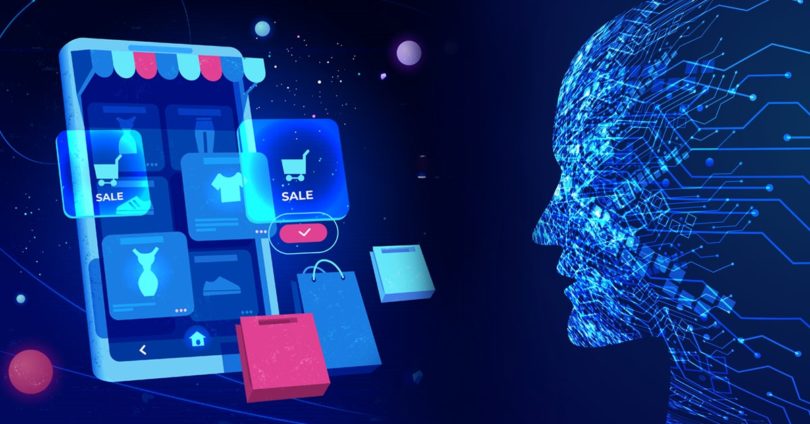Artificial Intelligence is increasingly becoming a part of everyday life. With the potential to serve the tech industry by developing smart applications and resources, AI has been helping businesses generate tremendous growth and revenue over the past few years. AI has impacted the E-Commerce industry by introducing personalized experiences, advanced recommendation engines, and virtual shopping assistants. The online retail market mostly relies on AI to build customer satisfaction by analyzing their behavior, search results, and previously bought products. Predictive AI and Deep Learning are producing human-like personalities to provide customers with a splendid shopping experience.
Some Facts and Stats That Will Surprise You:

- According to Statista, the global chatbot market is expected to reach $1.25 billion by 2025, driven by the growing demand for personalized customer experiences and the need for businesses to automate customer support processes.
- As per a Grand View Research report, the worldwide market for AI in retail is projected to hit $23.6 billion by 2025.
- AI in E-Commerce is helping reduce warehousing and forecasting errors by 30–50%. – IBM
- 63% of consumers find AI-powered product recommendations to be highly influential on their purchases. – PR Newswire
Predicting Trends and Customer Behavior

AI is becoming an important tool for understanding customer behavior and predicting trends that follow. The data from various sources, like order history, search results, and browsing history, is analyzed to predict emerging trends with precision and anticipate what customers want next. An individual user’s detailed profile is generated, which consists of information about their purchases, a wishlist summary, and searched items. This enables E-Commerce businesses to craft marketing strategies, personalized product recommendations, and optimize their offerings to meet the requirements and interests of their targeted audience.
Some of the examples are listed below:
- Amazon’s Recommendation Engine uses customer data to give product recommendations to the user. This helps to improve the shopping experience and generate a good sales rate.
- Netflix’s Content Recommendations focus on user satisfaction and retention by using deep learning algorithms to recommend movies and web series to the user.
- Spotify creates playlists by analyzing the listening history and search results of the user, introducing new music and entertainment.
- Sephora’s Virtual Artist uses AR technology that provides personalized makeup recommendations by analyzing facial features, therefore increasing customer satisfaction.
- Pinterest’s Visual Search feature enables users to find visually similar products by uploading images, helping users discover items based on their preferences.
Virtual Shopping Assistants

Virtual Shopping Assistants give customers a platform where they can get answers to their questions about the products or services. These are AI-powered Chatbots that provide instant assistance to users while purchasing. This reduces customer hassle and increases customer satisfaction. Virtual shopping assistants are built on strategies like Natural Language Processing (NLP) and Human Agents integrations thus boosting overall shopping experiences.
Benefits of AI in E-Commerce
AI helps online stores provide a better service to run smoothly and grow in a tough market. Some benefits of AI in E-Commerce businesses include:
1. Customer Satisfaction:
- AI personalizes the shopping journey by recommending products based on past behavior and preferences, mimicking the role of a helpful salesperson in a physical store.
- Chatbots powered by AI provide 24/7 customer support, answering questions and resolving issues efficiently.
- AI can even analyze sentiment in customer reviews to identify areas for improvement.
2. Increased Sales and Revenue:
- By understanding customer behavior, AI can optimize product placement and pricing strategies, leading to more sales.
- AI-powered marketing tools can target the right audience with the right message at the right time, maximizing return on investment.
3. Improved Efficiency and Operations:
- AI automates repetitive tasks like order fulfillment and inventory management, freeing up staff for more strategic work.
- AI can analyze data to predict demand and optimize inventory levels, reducing the risk of stockouts or overstocking.
4. Smarter Search and Product Discovery
- AI personalizes search results based on individual needs, making it easier for customers to find what they’re looking for.
- AI-powered visual search allows customers to upload an image and find similar products, streamlining product discovery.
Disadvantages and Challenges
While AI brings a lot to the table for E-Commerce, there are also some downsides and challenges to consider:
1. Data Privacy and Security:
- AI relies heavily on customer data to function. This raises privacy concerns, as customers might be uncomfortable with the amount of information collected. Businesses need to be transparent about their data practices and ensure strong security measures.
2. High Initial Costs:
- Implementing AI solutions can be expensive. This includes investment in infrastructure, skilled personnel, and ongoing maintenance. Smaller businesses might find the initial cost a barrier to entry.
3. Algorithmic Bias:
- AI algorithms can perpetuate biases present in the data they’re trained on. This can lead to unfair recommendations or discriminatory practices. Careful selection and monitoring of training data is crucial.
4. Customer Trust and User Experience:
- Overdependence on AI Chatbots might lead to impersonal interactions and a lack of human touch, which can frustrate customers. Finding the right balance between AI and human interaction is important.
5. Limited Explainability:
- In some cases, AI models can be like black boxes – their decision-making process might not be easily understood. This can be problematic, especially when dealing with sensitive issues.
Optimization and the Future of AI in E-Commerce

AI is transforming E-Commerce by analyzing massive amounts of data to improve the customer experience and business operations. Customers enjoy personalized suggestions and chatbot assistance for a smoother shopping experience. Meanwhile, businesses benefit from optimized inventory, dynamic pricing, and efficient logistics, all thanks to AI. The future holds even more promise, with AI suggesting optimal actions and creating personalized content for a truly frictionless shopping experience. In short, AI optimization is the key to a future of happy and efficient E-Commerce for everyone.
Final Thoughts
Partner with GrayCell Technologies to supercharge E-Commerce businesses with our high-tech AI solutions. We offer personalized experiences, smart recommendation engines, virtual shopping helpers, and AI automation tools. GrayCell helps E-Commerce businesses boost sales, engage customers better, and stay competitive. Our expertise can help businesses grow, work smarter, and deliver awesome shopping experiences that keep customers coming back for more.
Ready to take your E-Commerce business to the next level with AI? Book your free consultation with GrayCell Technologies today!







